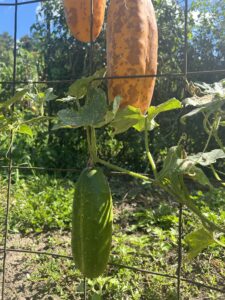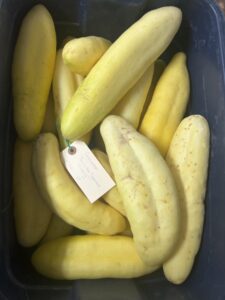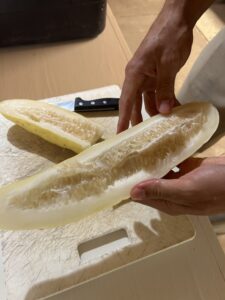More to Explore
Growing Guide: Cucumber

Grow and Save Cucumber Seeds
How to Grow Cucumbers
Cucumber plants grow well in many regions of the United States, producing prolific quantities of fruit that can be enjoyed fresh or preserved as pickles. Cucumbers are a great plant for beginning seed savers.
Time of Planting
Direct-sow cucumber seeds after the danger of frost has passed and the soil temperature has warmed.
Spacing Requirements
In your garden, make 12-inch hills at least 6 feet apart. Plant 6-8 cucumber seeds per hill. Plant seeds 1 inch deep. After germination, thin to 3-4 plants per hill.
Time to Germination
4-10 days
Special Considerations
Cucumber plants being grown for a seed harvest occupy garden space for a longer time than those grown for eating, approaching seed maturity upwards of 45-60 days after pollination, but they are otherwise cultivated in the same way for both purposes.
Common Pests and Diseases
Cucumbers are particularly susceptible to cucumber beetles, slugs, deer, raccoons, squash vine borer, belly rot, downy mildew, anthracnose, and powdery mildew.
Pests such as cucumber beetles can be picked off and placed in buckets of soapy water. Trellising can help improve airflow around plants, thus reducing bacterial and fungal infections.
When and How to Harvest for Food Consumption
Once cucumber plants begin producing fruit, check your garden daily for ripe cucumbers. You can pick cucumbers early for making pickles or you can wait a while for larger slicing cucumbers.
Eating
Cucumbers add a great crunch to fresh green salads, yogurt sauces, and sandwiches. You may also want to try pickling your garden cucumbers or this White Gazpacho (Ajo Blanco) recipe from Beth Dooley, chef and author. Cucumbers add a fresh, vibrant flavor, and sherry vinegar makes a snappy finish. It’s hearty enough for lunch or a light dinner paired with tomato-topped bruschetta.
Storing
Cucumbers will keep for 10-14 days at temperatures of 45-55 degrees F and a relative humidity of 85-95%.
How to Save Cucumber Seeds
Life Cycle
Annual
Recommended Isolation Distance
Separate varieties by 800 feet – ½ mile.
Recommended Population Sizes
You only need to plant 1 cucumber plant in order to harvest viable seeds. To maintain a variety over time, save seeds from between 5-10 plants. If you’re saving seeds for genetic preservation of a rare variety, save seeds from 25 plants.
Assessing Seed Maturity
Cucumbers are eaten as immature fruits. When cucumbers are grown for seed, harvest is delayed until the fruits reach botanical maturity. As the seeds develop, the cucumber will continue to grow beyond its market-mature size, eventually changing color and losing firmness as the seeds reach full maturity. Cucumbers can change color to yellow or orange. It is best to wait several weeks after this color change before extracting the seeds.


Harvesting
If weather and plant health allow, the fruits can be left on the vine in the garden while they continue to mature and soften. Otherwise, the fruits can be picked and held in a container until the fruits begin to soften. Mature cucumbers will pull easily from the vine when ripe.
Cleaning and Processing

Cut cucumbers in half lengthwise to extract the seeds. Scoop out seeds and any surrounding pulp from the seed cavity.
Place this mixture of seeds and pulp into a small bucket or jar with some water. The mixture needs to undergo fermentation for 1-3 days to remove the pulp from the seeds. The fermenting mixture should be held in an open container at temperatures between 70-80 degrees F.
When fermentation is complete, decant the seeds by adding more water to the container and stirring the mixture – the pulp and lightweight seeds will float to the top and can be poured off, leaving only viable seeds that will have settled at the bottom of the container.
Once the seeds have been rinsed clean, set the seeds out to dry on coffee filters or old window screens until they pass the snap test.
Storage and Viability
Store cucumber seeds in a cool, dark, and dry place in an airtight container to keep out moisture and humidity. When stored under these conditions, cucumber seeds will remain viable for 5 years. Learn more about seed storage.
Cucumber Brining (Video)
Ruth Hampton of Trout River Catering walks us through one of the tricks of her trade to keep watery vegetables looking delicious: cucumber brining.
Originally filmed for the Conference & Campout 2020.
How to Save Cucumber Seeds (Video)
Follow along with Alan, greenhouse coordinator at Seed Savers Exchange, as he walks you through the steps of extracting, cleaning, and drying seeds from cucumbers grown at Heritage Farm.